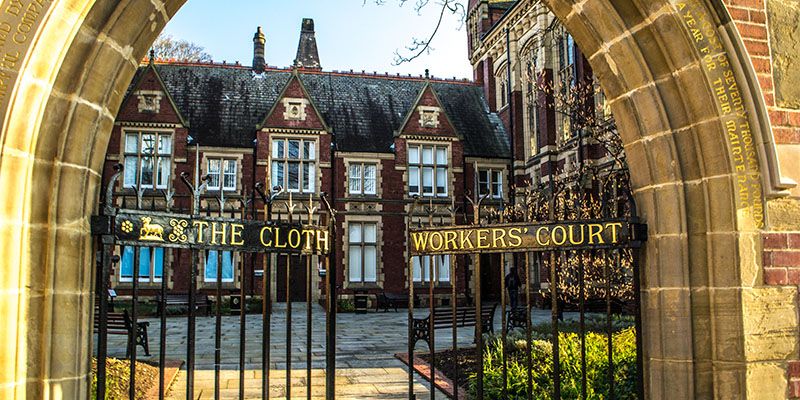Trusts and foundations

Many philanthropic organisations have left their mark on the University of Leeds over the last 100 years, transforming the lives of students and advancing the impact of the University through contributions to new buildings, fellowships, scholarships, vital research and our cultural treasures.
Support from trusts and foundations has been crucial in ensuring young people who could benefit from a university education at Leeds have the chance to do so, through direct financial support or by opening doors.
Trust donors have also supported generations of scholars to pursue their studies at Leeds, whilst grant funding has played a key role in allowing us to share the cultural treasures held in our Special Collections and galleries, and around our campus.
Read about how we work with philanthropic trusts and foundations to develop talent, fund world-leading research and benefit the wider community:
Our work with philanthropic trusts and foundations
Developing talent
Reach for Excellence programme
In addition to generous support for scholarships, the Liz and Terry Bramall Foundation support the ‘Reach for Excellence’ programme.
Reach for Excellence (RfE) is the flagship widening participation scheme at the University of Leeds. The programme has a successful track record in supporting and stretching students with the potential to gain a place at a research-intensive university, but who may not have considered it (or who may perceive barriers to entry).
RfE provides support which extends beyond admissions, into Higher Education and professional life.
Laidlaw Undergraduate Research and Leadership programme
The Laidlaw Undergraduate Research and Leadership programme operates at more than a dozen leading universities worldwide through the support of the Laidlaw Foundation, established by alumnus Irvine Laidlaw (Economics, 1963). It enables talented students to gain the skills and experience to become active global citizens and ethical leaders.
Funding Masters students from around the world
The Allan and Nesta Ferguson Charitable Trust has funded international students from around the world to undertake a Masters degree, furthering their careers and benefiting their home countries with the skills and relationships they develop studying at Leeds.
Funding world-leading research
Cutting edge research facilities in the Bragg Building
The Wolfson Foundation and Garfield Weston Foundation have invested in cutting edge research facilities in our new Bragg Building.
The Wolfson Imaging Facility will allow biologists and physicists to work together, developing interdisciplinary research programmes using equipment that allows us to image materials in unprecedented detail in real-time.
Support from the Garfield Weston Foundation is ensuring our surgical robotics research is equipped to enable earlier diagnosis, wider screening and more effective treatment for life-threatening diseases such as cancer.
Developing technologies and tackling global challenges in textiles
Clothworkers Court, the red-brick courtyard in the heart of campus, and the University’s magnificent Clothworkers’ Centenary Concert Hall, recall donations made by the Worshipful Company of Clothworkers, a partnership which has continued since Victorian times.
In 2012, the Clothworkers’ Company helped to establish the Clothworkers’ Centre for Textile Materials Innovation for Healthcare (CCTMIH) at the University of Leeds, with a £1.75 million anchor donation. The Centre works to develop enabling technologies based on advances in textile science and engineering. From bioactive wound dressings to implantable devices aiding the regeneration of bone or skin – the application of textiles in healthcare is a rapidly developing field.
In 2021, a significant investment from the Clothworkers' Company helped the University to launch the Leeds Institute of Textiles and Colour (LITAC). The new institute will tackle global challenges – such as those created by fast fashion, and the need for advanced materials, manufacturing processes and sustainable products – by partnering with industry to apply the world-class research expertise found across a wide range of disciplines at the University.
Understanding and preventing scleroderma
Professor Francesco Del Galdo leads a national programme for research into the inflammatory disease, scleroderma.
Funding from the Kennedy Trust for Rheumatology Research has helped to fast-track Leeds’ position as a world-leader in rheumatology treatment and research, enabling new work to understand the causes of scleroderma – and search for the drugs which might prevent it.
The CACTUS project
The Bill and Melinda Gates Foundation has funded work across the University, including the CACTUS project.
Led by Professor Barbara Evans, this research covers the global assessment of fecal sludge management options in cities across the global south, providing a new approach to assessing and reporting the cost of urban sanitation services.
Benefitting the wider community
Sharing our unique collections
The National Lottery Heritage Fund has played a significant role in opening our unique collections, helping build our Treasures of the Brotherton Gallery and Marks and Spencer Archive, and funding work to share the multi-media archives of the Survey of English Dialects in our archive of vernacular culture in partnership with regional museums.
Restoring Hardknott Forest project
Our Restoring Hardknott Forest project is a once-in-a-generation opportunity to transform one of the largest conifer plantations in the UK’s Lake District National Park into wild native woodland.
Together with the United Bank of Carbon, Copeland Community Foundation and The North Face Explore Fund (with the European Outdoor Conservation Association), we are engaging local people and school children to create 630 hectares of native woodland, protect over 250,000 native trees and remove and store 25,000 tonnes of carbon dioxide.
Improving academic attainment for young children
Funding from the Education Endowment Foundation has seen Leeds researchers deliver two trials looking at how joined-up approaches to health care and education can improve academic attainment for young children – leading to a national roll out of the ‘Glasses in Classes’ programme by the Department of Education.
Improving the concentration and memory of primary school children
The Waterloo Foundation has funded work looking at how integrating exercise breaks into classroom work can improve the concentration and memory of primary school children.
Work with us
If you are interested in talking to us about how we might work together, please email Rebecca Morgan at foundations@leeds.ac.uk